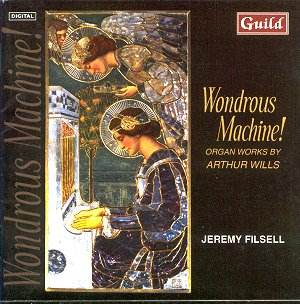Arthur Wills, who celebrated his 75th birthday
in September 2001, was Director of Music at Ely Cathedral from 1958
to 1990. In one way it’s a pity that these recordings were not made
in the organ loft where he presided with such distinction but the very
fine Tonbridge instrument, built as recently as 1995, serves his music
very well.
The programme chosen for this recital presents a nicely
varied overview of his large portfolio of organ compositions. All the
music is as accessible to the listener as it must be difficult for the
performer. As you would expect from such an experienced recitalist Wills
exploits the full tonal range of the organ but one never feels that
the music has simply been written for display purposes.
The recital opens with a brilliant toccata, very much
in the cathedral tradition, but the following piece, like much else
that follows, is much more secular in character. In his notes (in which
he offers entertaining asides about the background to the various compositions)
Dr. Wills relates that he originally thought of transcribing Rachmaninov’s
celebrated ‘Vocalise’ for organ. Eventually he decided to produce an
original composition instead and the result is a highly effective piece
which is, in Wills’ words, "a homage with some reference to [Rachmaninov’s]
inimitable idiom."
The "Alkmaar" Prelude and Fugue was written
expressly to be played at a recital on an organ in that Dutch city.
Wills also relates that he envisaged the piece as a homage to the North
German school of organists, including Buxtehude. The result is a commanding
and testing piece which, like everything else on the disc, is dispatched
with aplomb by Jeremy Filsell.
"The Ely Imps" is an atmospheric and, dare
one say it, "impish" scherzo inspired by some gargoyles in
the choir of Ely cathedral. Apparently it is based on a plainchant theme
though this is not easy to spot. The plainchant becomes the basis for
a whirling, spiralling display piece. Tremendous fun! Later on in the
programme there’s another equally successful though very different scherzo.
Such tours de force are obviously a Wills speciality.
The work which gives the CD its title could, perhaps
be subtitled "The Organist’s Riposte to Britten". Cheekily,
Wills re-cycles the title of Britten’s celebrated orchestral "guidebook".
Furthermore, he uses for his material a (different) theme by the same
composer, Purcell. Wills himself delivers the narration and I’m sorry
to say I find this a bit of a distraction (just as the narration in
Britten’s work distracts when given in its original format – which is
fairly rare these days, I think). The music itself is expertly crafted
to show off the full resources of the organ and is very entertaining
(who could resist the perky, tongue-in cheek Rag movement?). The last
three of the fourteen short sections are played without the intervention
of narration and this allows an impressive build up to the full-throated
finale. I’d be interested to hear the whole piece without narration.
The other substantial piece in the recital is the Variations
on a Carol. The source material is a carol by Wills himself, ‘I sing
the birth was born tonight’, composed in the same year, 1965. The composer
describes the eleven variations as being in the "spirit of homage
to French organ music." Of course, given Jeremy Filsell’s well-known
affinity with the French repertoire, the work is in particularly safe
hands here. Certainly these Variations are highly effective and also
very enjoyable to hear. They build to a tumultuous and exciting conclusion.
To conclude, two splendidly entertaining short pieces.
The New Millennium Rag is built on three well-known hymn tunes although
Wills disguises them expertly. It is an infectious encore piece, delivered
here with the appropriate degree of panache by Filsell. The exuberant
Postlude is in a similar vein to the opening Carillon and closes the
programme with a suitable flourish.
This is a splendid 75th birthday tribute
to Arthur Wills. It is probably an indication of the respect in which
he is held amongst fellow organists that the list of sponsors of the
project who are credited in the notes includes at least two other British
organists. Jeremy Filsell plays the entire programme with a virtuosity
which is seemingly effortless and he conjures some exhilarating timbres
and sonorities from the Tonbridge organ. The recorded sound is first
rate. This disc will give great pleasure to "organ buffs"
and to a wider audience, too, I hope. Recommended.
John Quinn
See also review by Hubert
Culot

![]() Played by Jeremy Filsell
on the organ of Tonbridge School Chapel
Played by Jeremy Filsell
on the organ of Tonbridge School Chapel ![]() GUILD GMCD 7225 [77.37]
GUILD GMCD 7225 [77.37]